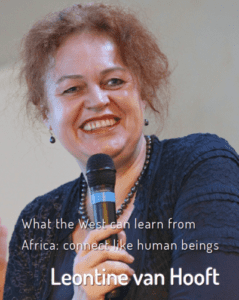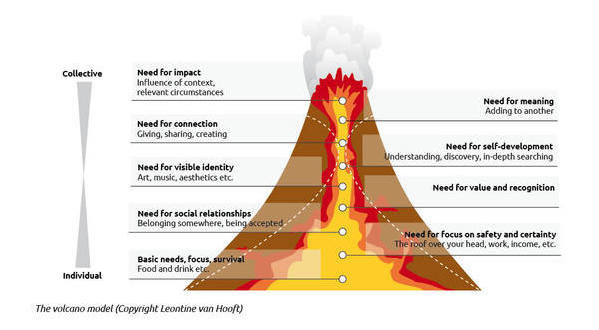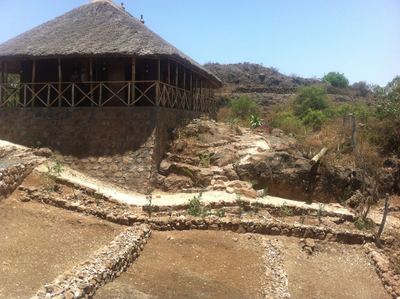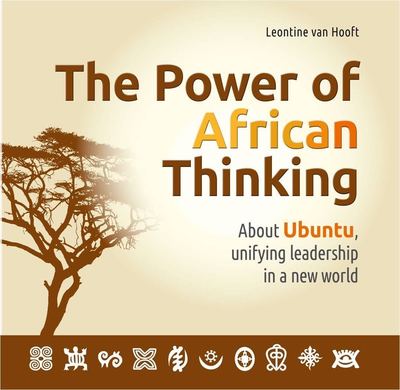 “Working in Africa is fundamentally different than in Western societies.” Leontine van Hooft, a Dutch corporate anthropologist and entrepreneur, learned a lot when she started a venture in Africa seven years ago. She shares her insights in “The Power of African Thinking – About Ubuntu, unifying leadership in a new world”. Are you open to learn a few leadership lessons from other cultures?
“Working in Africa is fundamentally different than in Western societies.” Leontine van Hooft, a Dutch corporate anthropologist and entrepreneur, learned a lot when she started a venture in Africa seven years ago. She shares her insights in “The Power of African Thinking – About Ubuntu, unifying leadership in a new world”. Are you open to learn a few leadership lessons from other cultures?
“African people are living closer to nature and family than we are. It causes a focus on long-term relationships and sustainability. They know the power of connection: the larger family group will help you survive. Because they value the family the largest funding for Africa has always come from individual Africans who worked abroad and sent money back home – not from governments, NGO’s or charity organizations. This long-term focus on connection and sharing brings about a fundamentally different approach to doing business and collaboration.”
Longing for connection again
This is what the West can learn from Africa. Leontine talks enthusiastically about her work and her book “The Power of African Thinking – About Ubuntu, unifying leadership in a new world”.
“The business environment has changed because of the economic crisis. People are fed up with unethical behaviors, short-term profit maximization and the separation it causes in society. Especially small and medium-sized enterprises, often family-owned, are looking for a more balanced way of working. We’re starting to long for connection and co-creation again.”
“Society at large is also moving toward a new paradigm. After the extreme rationalization and money-making mindsets in the 80s and 90s, people want meaning and connection. The old flower-power generation is ready to retire and they want to pay back to the community. People like Bill and Melinda Gates are examples. Eventually, people want to give back. I think we need to extend Maslow’s pyramid of needs. It doesn’t end on top with self-actualization. From that top follows an eruption of new stages: people want to give, want to share, and want to co-create.”

Check your assumptions
Leontine and her husband Leon van Rijckevorsel, an area development specialist, both ran their own businesses when they decided to spend the fifth day of the workweek on a “matter of the heart”. Having guided corporations in diversity, integrity, and intercultural management, Leontine felt it was time for something different. The couple saw poverty – and their answer was tourism area development.
Seven years later, their new venture Green Dream Company is building vacation resorts in Ethiopia and Rwanda together with the local community. They revitalize nature, develop the area, and help the community learn necessary competencies. Leontine and Leon don’t use a top-down approach, telling the locals what to do. Leontine works with them, but doesn’t stand above them. “As the leader, I connect with my team and I facilitate co-creation. I have learned so much in Africa. I have learned to listen, for instance. When you talk with your African colleague, you tend to assume you know what they mean because you operate from Western values. Working in Africa has taught me to suspend judgment and question my assumptions. You must observe and listen carefully – what is going on here?”
Choose what you see
 “I’ve become more aware that you choose your own perspective – and that perspective determines what you see – and thus what you do. One example: in Ethiopia we stayed in the same hotel as a group of Médecins Sans Frontières (the NGO that sends medical staff to developing countries). We had found a great location for our resort and I was radiant with enthusiasm. I had seen beautiful flowers, apes, hippo’s and I’d met great people that day.
“I’ve become more aware that you choose your own perspective – and that perspective determines what you see – and thus what you do. One example: in Ethiopia we stayed in the same hotel as a group of Médecins Sans Frontières (the NGO that sends medical staff to developing countries). We had found a great location for our resort and I was radiant with enthusiasm. I had seen beautiful flowers, apes, hippo’s and I’d met great people that day.
The meds were completely discouraged and depressed. They had been to the same location, but they had seen HIV and Malaria. They focused on shortage and what was wrong. Both perspectives were correct. This is what leadership is about. What do you choose to focus on? I focus on what is working well, what is present, and to build upon that.”
The collective consists of whole humans
“Africa fascinated me. Collaborating was completely different. I started to ask, learn, and I read about the South-African philosophy Ubuntu – this philosophy goes by several names throughout Africa. The focus is on the interest of the collective, the community, but it also takes into account the individual human beings that make up the collective. There is no separation between the professional or the private person; they are whole humans.
In the West, we see the professional at work for 8 hours a day. In Africa, we see the whole individual, which means a commitment for 24 hours a day. That gives organizations another dynamic and it brings an integration of different roles a person can have. It means you get to know each other well. Co-workers know your other roles and competencies in life – and they acknowledge them. It also means you don’t leave your ethical values at the doorstep when you enter your office. You are whole.”
Connect and co-create
 “I stopped having formal meetings and performance appraisals. I simply opened my office door to be accessible and started drinking coffee with my team. We talked and got to know each other really well. It could be simple chat but also business. Everyone worked harder than ever before and sickness absence actually went down.
“I stopped having formal meetings and performance appraisals. I simply opened my office door to be accessible and started drinking coffee with my team. We talked and got to know each other really well. It could be simple chat but also business. Everyone worked harder than ever before and sickness absence actually went down.
People swap favors and help each other when you work like a family. One of my assistants bakes great cakes and she brings them to our meetings. We all appreciate that. One day, she was asked to do a presentation at her son’s school about our development work in Africa. She got really nervous but also excited – so she prepared and one of our marketing guys stepped in to help her make a great PowerPoint presentation. She was so proud and thrilled. She had learned a new skill and found new self-confidence. We were all so proud of her! Next, when the marketing guy was too busy, she helped him with social media.
Ubuntu means that when you learn new skills, the organization or community should benefit from it. It means the individual is there to give to the group – and take from it. But it doesn’t mean the group exists only to support the individual – who can take and take and take from it.
I may have received more than I have given to my teams – because I learned so much. As the leader, you give direction because of your position. But it doesn’t mean you are more important as a human being. It is simply a role you have. Compare this to power: you execute power. But you deserve authority. People will follow you because they choose to.”
The clan
 Imagine your organization as a community that everyone belongs to 24 hours a day. It becomes a clan, a family. So what do you do when someone is underperforming?
Imagine your organization as a community that everyone belongs to 24 hours a day. It becomes a clan, a family. So what do you do when someone is underperforming?
“This happened in my team in Rwanda. In the Netherlands we have a talk with said employee, then we try coaching and if that doesn’t work, we let the employee go. But my Rwandese business partner, an Islamic divorced woman (so check your assumptions here – did you expect my business partner to be a man?) said: “I’m his mom.”
She’s not literally his mom but she means she has to take care of this person. She’s going to look for a position that suits him better. Departing from what is working well, the half-full glass, she tries to find a position within our team. The aim is to try to work together for the long haul. It’s another perspective than a short-term focus on direct results and money and seeing the half-empty glass and scarcity. It’s about belonging and the whole person and abundance.”
Not everyone wants to or is able to work like this. It means you have to open up and connect. It means you have responsibilities to the group, in addition to rights and entitlements.
It means that leaders have to let go of total control or micromanagement. Did Leontine find this hard? It’s a great philosophy, but what if you invest your own money like she did? There’s a lot at stake.
“I absolutely believe that we can only do this together. It feels like a family to me. But don’t get me wrong: I lead the team where I want to go. But everyone has a say in it – and everyone is proud to be part of this team.”
In my next blog post, Leontine shows you how to practice Ubuntu when you meet in a circle to make decisions the African way…. To be continued!
Journaling questions – if you like:
- Are you ready to give, from the top of Maslow’s pyramid? Or are you at another level?
- How can you help yourself to listen well and suspend judgment?
- Are you aware of what you choose to see? The half-full or the half-empty glass?
- How can you open yourself to connect and co-create with your team? Are there things you find difficult to let go?
- Are you willing and able to connect with your clan – or do you prefer to separate your work and life roles?
Leontine van Hooft is an entrepreneur, author, and speaker. She founded the Green Dream Company.
The book The Power of African Thinking is available on Amazon.
Marcella Bremer is an author and culture & change consultant. She co-founded this blog and ocai-online.com.